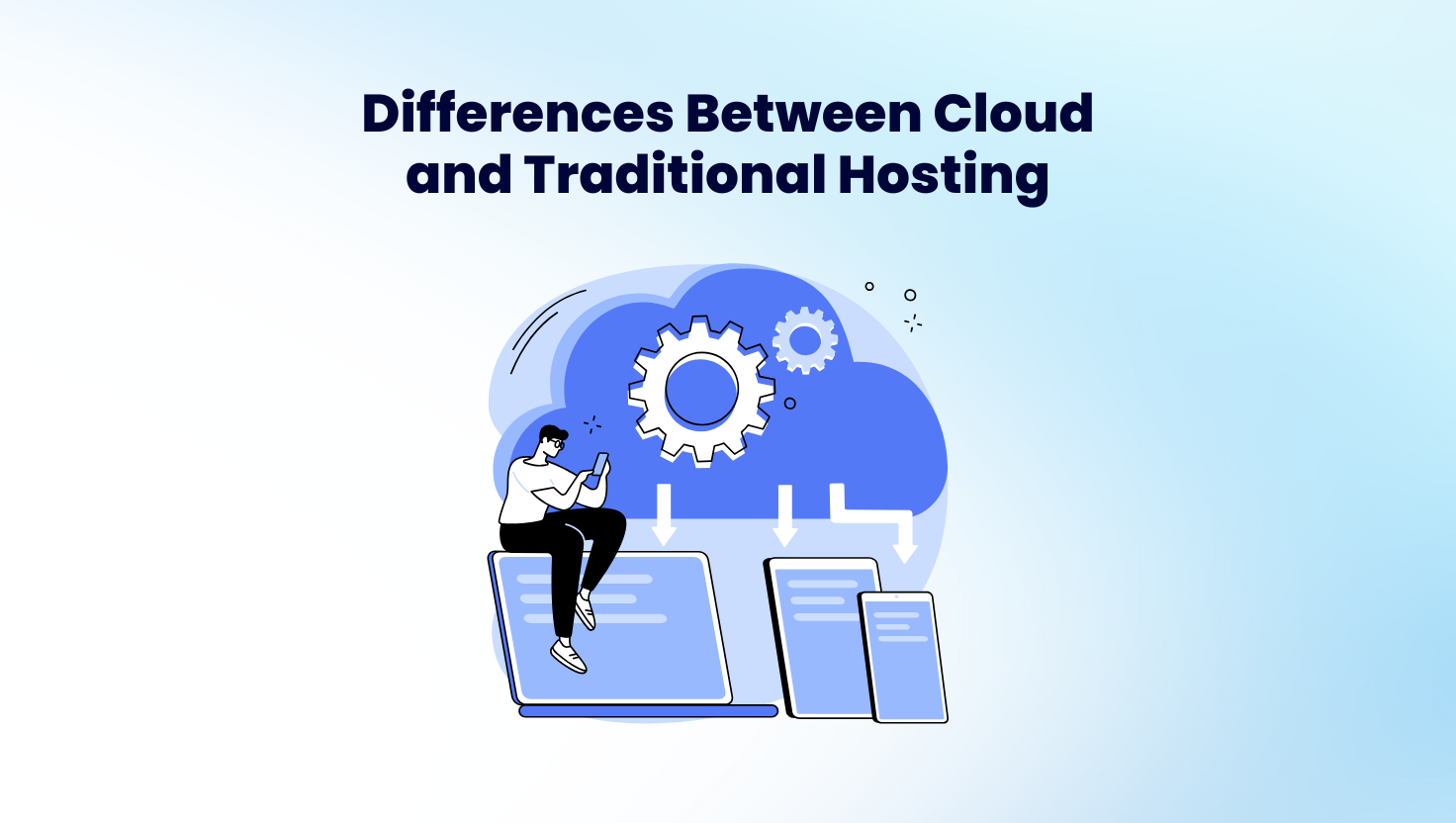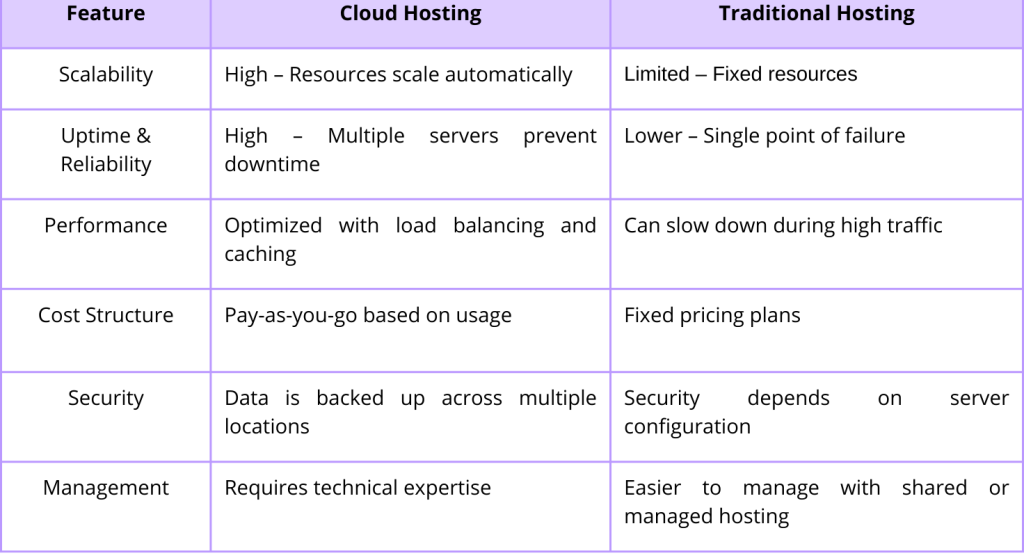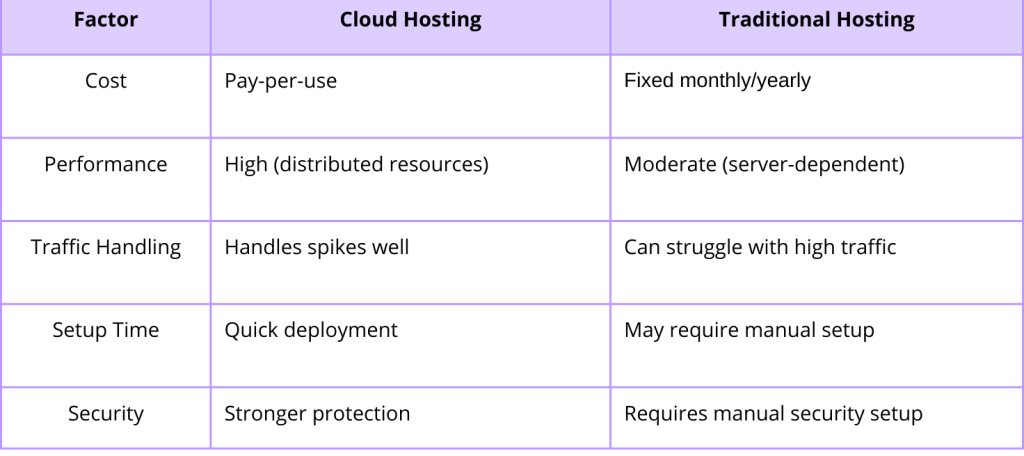
27 Feb Understanding the Differences Between Cloud Hosting and Traditional Hosting
A reliable hosting solution is essential for any business looking to establish a strong online presence. The choice between cloud hosting and traditional hosting can significantly impact your website’s performance, security, scalability, and cost-effectiveness.
Both options offer unique benefits and challenges, so understanding their differences is crucial in selecting the right hosting for your business needs. This guide will explore what cloud hosting and traditional hosting are, their pros and cons, key differences, and how to choose the best solution.
What is Cloud Hosting?
Cloud hosting is a modern hosting solution that distributes website data and applications across multiple virtual servers. Instead of relying on a single physical server, cloud hosting pulls resources from a network of interconnected servers, ensuring better scalability, performance, and uptime.
How Cloud Hosting Works
- Data is stored across multiple servers, reducing dependency on a single machine.
- If one server fails, another automatically takes over, preventing downtime.
- Resources adjust dynamically based on traffic needs.
- Businesses pay only for what they use, making it cost-efficient.
Pros of Cloud Hosting
- Scalability – Instantly scale resources to handle traffic surges.
- Reliability – Reduced risk of downtime due to multiple server backups.
- Performance – Faster load times with distributed data centers.
- Security – Data redundancy and built-in security features.
- Cost Flexibility – Pay-as-you-go pricing model.
Cons of Cloud Hosting
- Complex Management – Requires some technical expertise.
- Potential Cost Fluctuations – Costs vary based on usage.
- Security Risks – Data is stored off-site, requiring strong security measures.
What is Traditional Hosting?
Traditional hosting involves hosting a website on a single physical server. Businesses lease server space from a hosting provider, with resources allocated to them based on the selected plan.
Types of Traditional Hosting
- Shared Hosting – Multiple websites share a single server and its resources.
- VPS Hosting (Virtual Private Server) – A dedicated section of a server is allocated to each website.
- Dedicated Hosting – A business rents an entire server exclusively for its use.
Pros of Traditional Hosting
- Predictable Pricing – Fixed monthly or yearly costs.
- Simplicity – Easy to set up and manage.
- More Control (with VPS or Dedicated Servers) – Ability to configure server settings.
- Reliable for Small Websites – Works well for businesses with stable, low-to-moderate traffic.
Cons of Traditional Hosting
- Limited Scalability – Fixed resources make it difficult to handle sudden traffic spikes.
- Single Point of Failure – If the server crashes, all hosted websites go offline.
- Performance Issues – Shared hosting may slow down website speed.
Key Differences Between Cloud Hosting and Traditional Hosting

Choosing the Right Hosting Solution for Your Business
Selecting between cloud hosting and traditional hosting depends on business size, budget, scalability needs, and security concerns.
When to Choose Cloud Hosting
- Your website experiences fluctuating traffic and needs scalability.
- You require high uptime and reliability.
- Your business is growing, and flexibility is important.
- You want global reach and performance optimization.
- You prefer a pay-as-you-go pricing model.
When to Choose Traditional Hosting
- Your website has consistent, predictable traffic.
- You need a fixed-cost solution.
- You want full control over a dedicated server.
- Your business does not require extensive scalability.
- You prefer simpler hosting management.
Security Considerations in Hosting
1. Cloud Hosting Security Measures
- Encryption – Protects data while stored and in transit.
- Redundant Backups – Ensures data safety in case of a breach.
- DDoS Protection – Prevents cyberattacks from overloading the system.
- Regular Updates – Cloud providers frequently update security protocols.
2. Traditional Hosting Security Risks
- Data Loss Risk – If a single server crashes, data may be lost if not backed up.
- Manual Security Updates – Users are responsible for updates and patches.
- Limited DDoS Protection – Some plans offer weak protection against cyber threats.
Performance and Cost Comparison

PT. KDN Helps You Choose the Best Hosting Solution
Choosing the right hosting solution can be overwhelming, but PT KDN is here to help. We offer tailored cloud hosting and traditional hosting solutions to fit your business needs, ensuring optimal performance, security, and cost-efficiency.
Why Choose PT KDN?
- Expert Consultation – Get personalized recommendations based on your business needs.
- Reliable Hosting Solutions – Whether cloud or traditional, we provide the best infrastructure.
- Security & Backup Services – Protect your data with advanced security measures.
- Scalability Options – Grow your hosting plan as your business expands.


Sorry, the comment form is closed at this time.